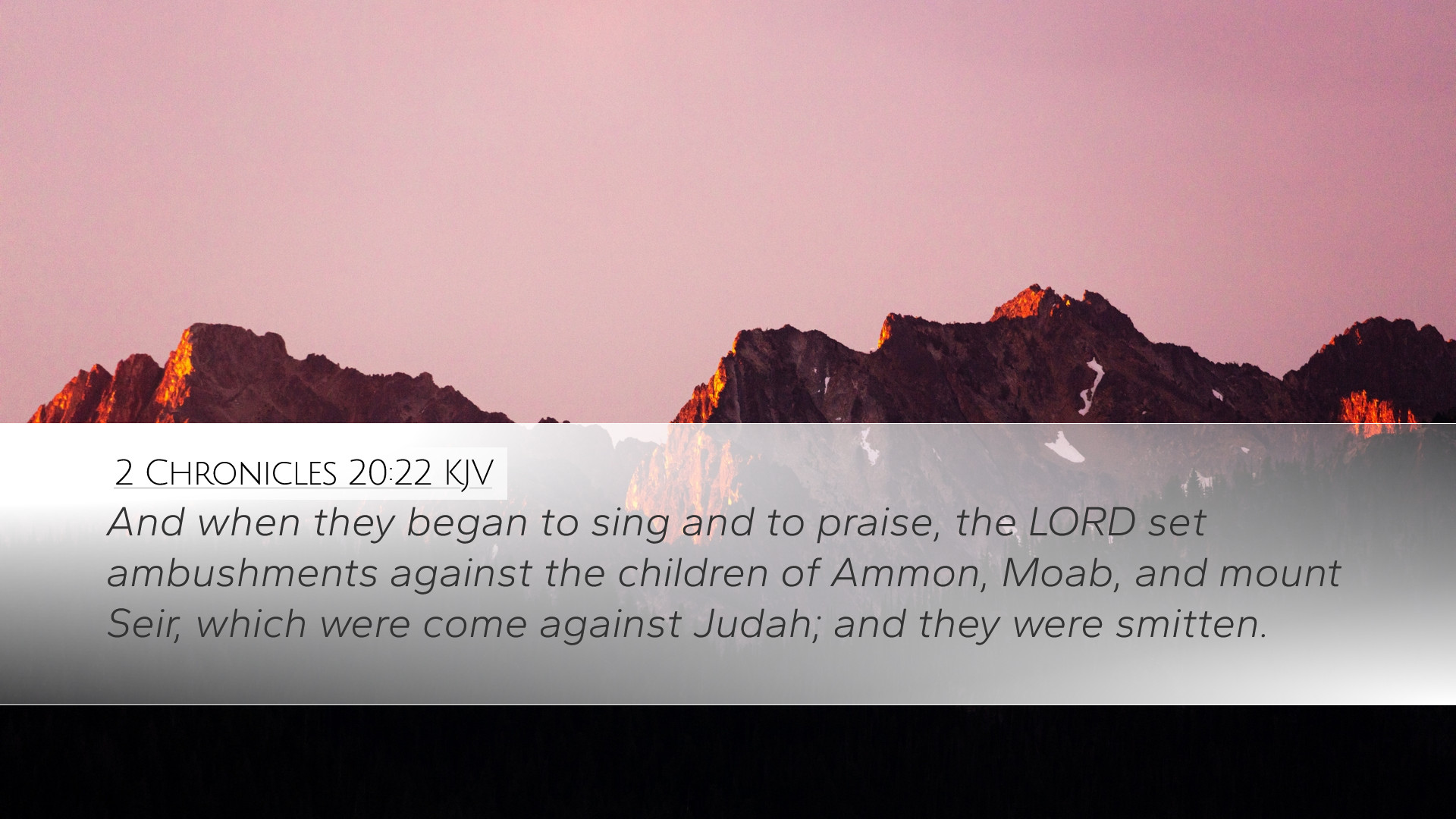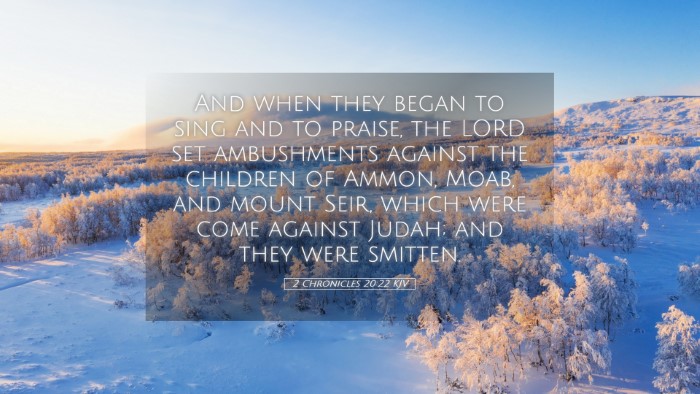Commentary on 2 Chronicles 20:22
Bible Verse: "And when they began to sing and to praise, the Lord set ambushments against the children of Ammon, Moab, and mount Seir, which were come against Judah; and they were smitten."
Introduction
This pivotal verse from 2 Chronicles speaks of divine intervention amidst a national crisis faced by Judah. The combination of singing and praising as a means of invoking God's power sets a profound theological principle for leaders and believers in their moments of despair. This commentary draws from renowned public domain sources to explore the implications of this verse in depth.
Historical Context
The background of this verse lies in a context of warfare where Jehoshaphat, king of Judah, faces a coalition of formidable enemies. The armies of Moab, Ammon, and Edom threaten Judah, igniting fear but also prompting a significant act of faith. Jehoshaphat's call for collective prayer and fasting is notable as it reflects a community turning towards God for deliverance (Matthew Henry).
The Role of Praise in Warfare
This verse draws attention to a profound truth: God acts powerfully in response to the praises of His people. The strategic choice to send singers ahead of the army signifies the prioritization of worship over military might. As noted by Albert Barnes, this reflects a deep-seated belief that God deserves glory even in dire circumstances. It shows that worship can serve as a potent weapon against spiritual and physical adversaries.
Worship as Warfare
- Divine Response: The act of singing precedes and prompts God's intervention; this illustrates the belief that God inhabits the praises of His people (Psalm 22:3).
- Faith in Action: The Israelites exemplified that faith is manifest not merely in silent prayer but in vibrant proclamation of God’s goodness, leading to tangible outcomes (Adam Clarke).
- Theological Implications: This establishes a pattern affirming God's sovereignty, as the conflict is resolved through divine action rather than human effort.
God's Ambush Against the Enemies
The mention of "God setting ambushments" indicates His direct involvement in the battle. This is not a figurative language but a profound assertion of God's capability to turn the tide in impossible situations. As Matthew Henry elaborates, God's methods are often unexpected, and His deliverance can come in surprising ways. The very presence of praise alters the atmosphere and paradigms of power.
Understanding Divine Sovereignty
- Control Over Creation: This event is a reminder of God’s ultimate control over even the most perilous situations.
- Enemies Confused: The enemies of Judah ended up fighting among themselves, highlighting God's ability to create confusion among opponents when His people trust and obey Him (Albert Barnes).
- Community Impact: The deliverance of Judah through praise serves as an encouragement for all of Israel, assuring them of God’s unfailing presence and power.
Lessons for Today’s Believers
In applying the insights derived from this verse, contemporary believers are challenged to recognize the power of worship in their spiritual battles. The act of incorporating praise into their prayers can yield heavenly assistance in their struggles—whether personal, communal, or societal.
Encouragement for Worship in Trials
- Shifting Focus: Focusing on God's greatness through praise can transform one’s perspective in difficult times.
- Unity in Worship: Collective worship strengthens the community and allows for engaging the divine as a united front.
- Anticipating God’s Move: Expectancy in worship can lead to miraculous outcomes, reinforcing faith amid trials (Adam Clarke).
Conclusion
The event captured in 2 Chronicles 20:22 is a transformative lesson that celebrates God’s power in the face of adversity and underscores the might of praise. For pastors, students, theologians, and Bible scholars, this text serves as an invitation to acknowledge the divine involvement in the affairs of men, urging an intentional incorporation of worship into everyday life as a declaration of trust in God’s sovereignty. As believers today engage in praise, they must hold firm to the promise that God is actively setting ambushments against their adversaries, finalized in the believer's trust and worship.


